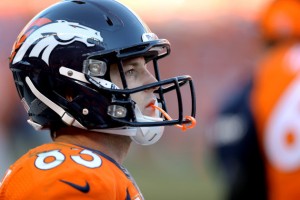

|
Back to Archive Index |
JANUARY 31,2014 Wes Welker Should Worry About the Long-term Effects of Getting Hit The first time Denver Broncos' wide receiver Wes Welker takes a hit during this Sunday's Super Bowl game, questions will arise about whether he can continue.  Earlier this week Welker, who sustained 2 concussions and missed the last 3 regular season games, said he would play in the Super Bowl even with a concussion.
He will wear a larger helmet that supposedly helps protect him from another concussion.
This week the National Football League announced the number of concussions had dropped 13% this season due to improvements in medical diagnoses, stiffer penalties for hits to the helmet, and fewer practices.
Many studies have shown the devastating, long-lasting health implications associated with concussions.
The growing concern is that repetitive head trauma can lead to chronic traumatic encephalopathy, a progressive neurodegenerative process leading to pronounced behavior changes and cognitive dysfunction.
But even hits to the head that don’t result in concussions can affect athletes’ brains and may impact learning.
Repeated blows to the head during a season of contact sports may cause changes in the brain's white matter and affect cognitive abilities even if none of the impacts resulted in a concussion, according to a new study published in the journal Neurology.
White matter, which transmits signals through nerve cells, actively affects how the brain learns and functions.
Using a form of magnetic resonance imaging, researchers at the Indiana University School of Medicine and the Geisel School of Medicine at Dartmouth College found significant differences in brain white matter of 80 varsity football and hockey players compared with a group of 79 non-contact sport athletes (track, crew and Nordic skiing) following 1 season of competition.
"The contact sports and non-contact sports groups differed, and the number of times the contact sports participants were hit, and the magnitude of the hits they sustained, were correlated with changes in the white matter measures," said lead author Thomas W. McAllister, M.D., chair of the Indiana University Department of Psychiatry, who was at Dartmouth when he conducted the study.
"In addition, there was a group of contact sports athletes who didn't do as well as predicted on tests of learning and memory at the end of the season.
We found that the amount of change in the white matter measures was greater in this group.”
The results suggest that some athletes may be more susceptible to repeated head impacts that do not involve concussions.
But much more research would be necessary to determine how to identify those athletes.
So even if Welker doesn't take a hard hit to the head, he may still suffer the effects of repetitive impacts, not just those that are diagnosed as a concussion.
Earlier this week Welker, who sustained 2 concussions and missed the last 3 regular season games, said he would play in the Super Bowl even with a concussion.
He will wear a larger helmet that supposedly helps protect him from another concussion.
This week the National Football League announced the number of concussions had dropped 13% this season due to improvements in medical diagnoses, stiffer penalties for hits to the helmet, and fewer practices.
Many studies have shown the devastating, long-lasting health implications associated with concussions.
The growing concern is that repetitive head trauma can lead to chronic traumatic encephalopathy, a progressive neurodegenerative process leading to pronounced behavior changes and cognitive dysfunction.
But even hits to the head that don’t result in concussions can affect athletes’ brains and may impact learning.
Repeated blows to the head during a season of contact sports may cause changes in the brain's white matter and affect cognitive abilities even if none of the impacts resulted in a concussion, according to a new study published in the journal Neurology.
White matter, which transmits signals through nerve cells, actively affects how the brain learns and functions.
Using a form of magnetic resonance imaging, researchers at the Indiana University School of Medicine and the Geisel School of Medicine at Dartmouth College found significant differences in brain white matter of 80 varsity football and hockey players compared with a group of 79 non-contact sport athletes (track, crew and Nordic skiing) following 1 season of competition.
"The contact sports and non-contact sports groups differed, and the number of times the contact sports participants were hit, and the magnitude of the hits they sustained, were correlated with changes in the white matter measures," said lead author Thomas W. McAllister, M.D., chair of the Indiana University Department of Psychiatry, who was at Dartmouth when he conducted the study.
"In addition, there was a group of contact sports athletes who didn't do as well as predicted on tests of learning and memory at the end of the season.
We found that the amount of change in the white matter measures was greater in this group.”
The results suggest that some athletes may be more susceptible to repeated head impacts that do not involve concussions.
But much more research would be necessary to determine how to identify those athletes.
So even if Welker doesn't take a hard hit to the head, he may still suffer the effects of repetitive impacts, not just those that are diagnosed as a concussion.
|
|
|
|
Disclaimer and Copyright · Site design by Marketorial.com
|